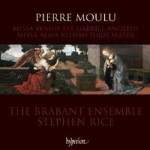It’s not easy to find the name Pierre Moulu mentioned in the music history books–and indeed this new recording claims to be the first devoted to his works. When I first heard the music on this disc I thought of the Flemish composer Gombert, who happens to be a contemporary of Moulu (which means roughly 1490s to 1550s) and who, like Moulu, may have been a pupil of Josquin. The long melodic lines, perfectly integrated with magnificently constructed delayed-resolution harmonic progressions, and the clearly defined textures recall not only Gombert but later contemporary English composer Robert Parsons–but no matter the associations, the music is prodigiously affecting and extraordinarily well-made. (I easily listened to this five or six times without ever feeling as if I’d had enough.)
Moulu was a master of the paraphrase–a reworking of a plainchant melody as the basis for a new composition–and of imitative counterpoint. He also perfected a type of structure, epitomized in his best-known work, the Missa Alma redemptoris mater, in which the singers could “skip” all the rests and just sing “breathing briefly”, thus creating a shortened version of the written Mass as well as a differently configured melodic/harmonic relationship among the voice parts. On this disc we hear the short version of the Alma redemptoris mater, but with two movements from the longer setting (the Kyrie and Agnus Dei) also offered as a bonus at the end of the program. We’re also treated to a motet by Josquin–Missus est Gabriel angelus–on which Moulu’s Mass was based.
There are so many highlights here–the lovely, short Kyrie of the Alma redemptoris mater; the powerfully moving In pace; the marvelous, searingly soulful Agnus Dei of the Missus est Gabriel angelus. And of course we–and Moulu–are lucky to have such superlative advocates of this music as the 11 members of the Brabant Ensemble and its director Stephen Rice, whose sensitively balanced, tonally ravishing performances were expertly recorded in the complementary acoustics of the Chapel of Harcourt Hill, Oxford Brookes University. Moulu may not be one of the 16th century’s major composers, but he is certainly talented enough, his music impressive enough, to be considered among the abovementioned masters, along with others such as Crecquillon, Clemens, and Sheppard, and he certainly deserves this dedicated program. The package is enhanced by informative notes by Rice (who’s in the midst of preparing critical editions of Moulu’s Masses) and an interesting discussion of issues concerning Latin pronunciation. Highly recommended. [4/26/2010]
































